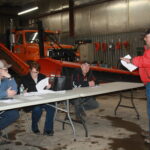Much as it has been for decades, preventing erosion from croplands is a major goal for conservation efforts in central Aroostook County.
Board members of the Central Aroostook Soil and Water Conservation District met with Presque Isle-based officials from the U.S. Department of Agriculture’s Natural Resources Conservation Service for an informal public meeting to discuss challenges and opportunities.
Seth Jones, an NRCS district conservationist in Presque Isle, convened the meeting to get ideas and feedback from stakeholders within the Central Aroostook Conservation District. Jones said he’ll take the information to state NRCS leaders as they submit suggestions for the 2018 funding cycle of the Environmental Quality Incentives Program, a voluntary federal program offering farms financial and technical assistance for conservation projects.
Soil conservation has been a perennial issue since the 1930s, when the NRCS started, and it continues to be of interest to government agencies and farmers in Aroostook County amid a focus on soil health practices like cover crops, which can reduce erosion and help build soil quality.
David Guerrette, a member of the Central Aroostook Conservation District and a forestry professional who owns a tract of woodlands near his home in Washburn, said he was troubled by erosion he saw at nearby leased farmland this past summer.
“This year, from anywhere from two-to-three months, there were hundreds of acres of soils that had been tilled after the snow left and then left blank,” Guerrette said. “The soil was tilled in May. June, July, August sat there, nothing on the land, and all of a sudden a broccoli crop showed up.”
Guerrette said the abutting landowner who rents out the land to growers lost a lot of topsoil that had been built up over many years. Some of the erosion also ended up around roadways and had to be hauled off by Presque Isle government workers.
“I’ve never seen the streams, river and abutting landowners receive so much topsoil,” he said. “The two streams that go through my property go into the Aroostook River. The river and the streams through my property have turned chocolate and the lake behind me has got two to three inches of topsoil at the bottom of the lake. There’s been more damage done this year to my forestland than ever in my 50-some years of living there.”
Guerrette’s concerns in his neck of the Aroostook watershed exemplify some of the conservation and soil health issues that can arise as farmers rent land for broccoli, grains, potatoes and other row crops.
When that’s the case, “Who’s the guys who’s actually taking care of the soil?” asked George Howe, Presque Isle’s code enforcement officer and a member of the conservation district board.
A decade ago, the city of Presque Isle dredged up soil from Mantle Lake, part of the Dudley Brook watershed, to address algae problems. It cost more than $150,000, and there was still an estimated half-acre out of 3.5 acres of soil left behind, Howe said.
Jones said that the NRCS aims to offer a variety of solutions to farmers and landowners who can address issues with anything from cover crops to sediment capture basins. Over the past few years, more than half of NRCS funding in central Aroostook has gone towards cropland erosion efforts, and the NRCS along with other groups are working on an erosion and water pollution reduction project for the Merritt Brook watershed, a tributary of the Aroostook River in Presque Isle.
More broadly, many potato farmers are trying to extend their field rotations beyond the traditional two-year potato and grain cycle, said Gary Belyea, a District member from Mars Hill.
“Everyone’s going to a three-year rotation, and I know a lot of them are struggling to find a decent cover crop to help carry that second and third year out,” he said. “There’s quite a bit of experimenting going on with different ones,” he said, referring to trials at the Aroostook Research Farm on crops like flax and chickpeas. “They’re trying to find something that you can at least pay your land rent or your taxes on.”







